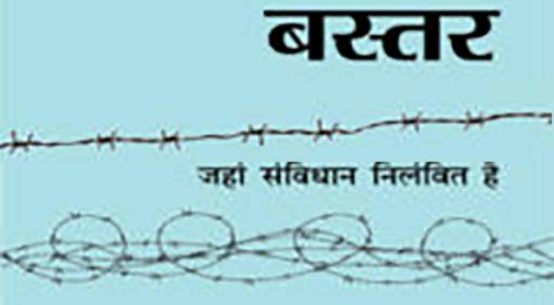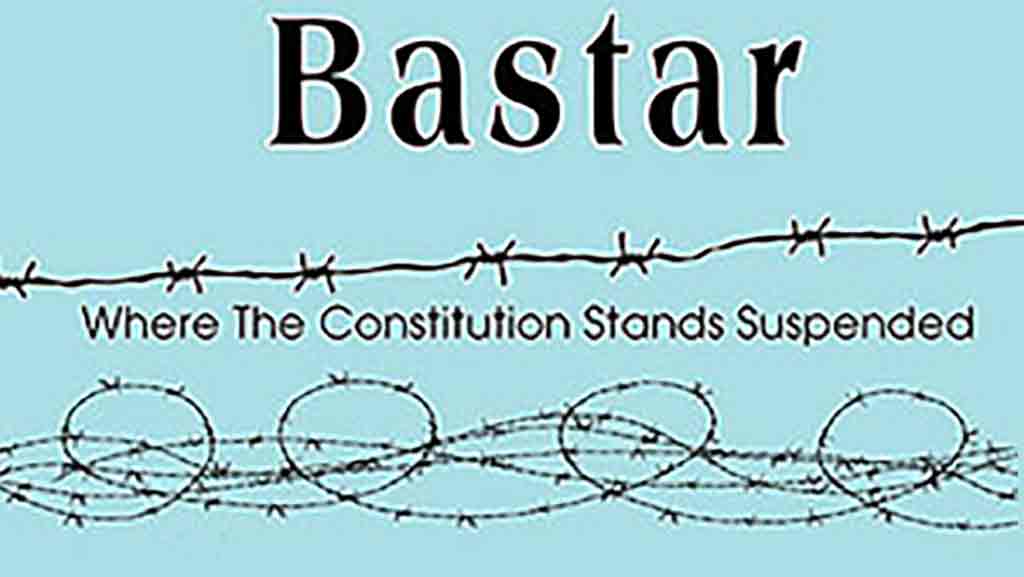

An 8-member fact-finding team of All India People’s Forum visited four districts Chhattisgarh (Bastar, Dantewada, Sukma, Bijapur) between 8-11 June 2016.
The AIPF team comprised former Madhya Pradesh MLA Dr Sunilam of Samajwadi Samagam, former Jharkhand MLA and CPIML Central Committee member Vinod Singh, Kavita Krishnan, Secretary of All India Progressive Women’s Association, Brijendra Tiwari of AICCTU, Amlan Bhattacharya, State Secretary of PUCL West Bengal, Advocate Aradhana Bhargava of Chhindwara, Advocate Ajoy Dutta of Kolkata and Amlendu Choudhury. The AIPF team is also grateful for the participation of Bastar-based researcher and activist Bela Bhatia and Dantewada-based activist Soni Sori who accompanied the team.
Preface
Bastar today is witness to the most cynical mockery of constitutional values and civil liberties. Under cover of a war to ‘save Bastar from Maoism,’ or ‘make Bastar safe for democracy’, the Constitution is in fact being trampled to ‘make Bastar safe for corporations’ and ‘purify Bastar for the RSS.’ Every day, every week, there are horrific atrocities being unleashed on Bastar’s people – and the incidents outlined in this report should be seen, not as isolated aberrations but as the tip of the iceberg. Democracy is being hollowed out in Bastar.
The AIPF team divided into two groups daily to cover greater ground. Even so, there was much that we could not investigate given the paucity of time; the sheer volume of incidents calling for investigation; and difficulties of arranging suitable transport.
Several local intelligence men closely watched the team in Jagdalpur. Before we left Jagdalpur, one of them too our drivers aside, attempting to interrogate and intimidate them. The team was stopped, searched, photographed, and questioned interminably at police and CRPF check posts and camps, over and over again. On more than one occasion we were told that the number of our vehicle had been passed on to CRPF camps and police check posts in advance, and they had been asked to wait for us and question us. For instance, we were asked why it took us all day to reach Sukma from Jagdalpur and why we visited villages en route – the police at the check post at Sukma tried to intimidate our driver into revealing which villages we had visited and the names of villagers to whom we had spoken.
It was clear from the tenor of the questions that anyone wishing to speak to villagers is seen as ‘suspect’ and discouraged by the police, security forces and administration. We wish to put on record our concern about the safety of those who spoke to us, especially given the fact that villagers who have spoken to other fact-finding teams have faced harassment and threats. We have changed names in some of the instances, to protect the identity of the individuals.
Laboratory for the ‘Hindu Nation’
The AIPF team heard testimonies of several Christians in the Bastar district that spoke of systematic attempts to persecute Christian minorities; foment communal division and violence in adivasi villages; bend pro-adivasi laws to communal ends; and allow Hindutva groups to dictate to the police and administration. In this sense, communal fascist outfits already hold sway in parts of Bastar and Chhattisgarh.
The team also spoke to Son Singh Jhali, a lawyer who is handling many legal cases pertaining to persecuted Christians.
At several villages in Bastar district – including Karmari, Bade Thegli, Sirisguda and Belar – resolutions adopted under Section 129 (C) of Chhattisgarh Gram Panchayat Act have been wrongly invoked in violation of the spirit of the law to restrict non-Hindus from residing in the village, practicing and propagating their religion, or building places of worship, even though the Bilaspur High Court has quashed such gram sabha resolutions in the case of both Karmari and Sirisguda. (see Annexure 1)
Section 129 (C) of the Chhattisgarh Gram Panchayat Act, in keeping with the model of self-governance mandated by the Panchayats (Extension to Scheduled Areas) Act 1996 (PESA), that “the Gram Sabha shall have the power to safeguard and preserve the traditions and customs of the people, their cultural identity and community resources and customary mode of dispute resolution.” Instigated by the Bajrang Dal and VHP, this provision is being used to equate adivasi customs and culture with the Hindu religion and prohibit non-Hindu practices. Section 55 of the same Act has provisions to prevent land alienation in Scheduled Areas, stipulating that prior permission of the panchayat is needed to build new houses, change the design of houses and so on. This too is being misused to withhold permission for construction of churches, community bhawans and so on. The Bilaspur High Court on 16th October 2015 struck down such interpretations, ordering that “the impugned resolution shall not come in (sic) exercise of fundamental right to preach and propagate of (sic) religion and their faith” (W.P.(C.)No.1759 of 2014 CG Christian Forum and others Vs. State of CG and others). (See Annexure 2)
It is pertinent to quote, here, from the relevant Section (2.11.4) on the spirit of PESA in the Report of the Expert Group of the Planning Commission on ‘Development Challenges in Extremist Affected Areas’:
“Section 4 (a) of PESA mandates that State legislation on the Panchayats… ‘shall be in consonance with the customary law, social and religious practices and traditional management practices of community resources’. However, it is obvious that the Provisions of the Constitution and individual and community rights provided in other relevant laws of the Centre and states are relevant and their spirit and purpose should have primacy. Justice related issue of criminal, social and welfare spheres would be binding on traditional and customary bodies and also on GS (gram sabha) in SA (Scheduled Areas). Human rights and Constitutional values are sacrosanct and nothing that the traditional and customary bodies do or practice shall be against these rights and values.”
It is evident from the testimonies that the role of the police and administration is extremely lax. On some occasions the police have openly sided with the Bajrang Dal, refusing to protect the Christians. On one occasion the police and administration even failed to turn up having convened a gathering of Hindus and Christians, and possibly informed the Bajrang Dal that they would not turn up, thus setting the scene for organized mob violence against the Christians. On the occasions where the district administration and police have intervened, it has not been to enforce the rule of law and uphold the Constitution and arrest the Bajrang Dal mischief makers; rather the ineffectual mode of ‘dispute resolution’ has been adopted.
Testimonies
Pastor Pilaram Kawde,
village Bhadhisgaon,
Tokapal Panchayat, Bastar district
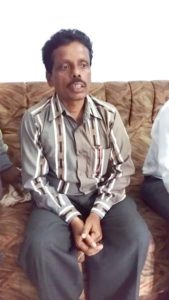
I laid the foundation for a prayer hall on my own land for which I have the papers. The panchayat orally refused to issue the No Objection Certificate for construction. I asked them to give me the order in writing. When they failed to do so for several days, I resumed construction. I was then given a written notice citing Sections 55 (1) and (2) Chhattisgarh Gram Panchayat Act 1993 saying I cannot be allowed to construct a place of worship for Christians because “People of big-big castes and religions live in this village, and every Dussehra even the Roopshila Devi Ma joins the celebrations,” and that the panchayat has the right to demolish the prayer hall. The Hindu villagers and panchayat leaders have threatened to evict me from the village. (see Annexure 3)
On 25 May 2016, an elderly Christian lady Saradi Bai died, but Hindu villagers provoked by the Bajrang Dal stopped us from burying her. They said we could not be allowed to carry out Christian burial rituals, bury her in a casket or place a cross in her grave. Eventually, after negotiations conducted by the police, she was buried in a casket but without the cross. But the Hindu villagers warned that no Christian burial would be allowed in future. Accordingly, the 200 Christians of the village gave applications to the SDM, Tehsildar, police and Sarpanch asking that burial grounds be allotted separately for Christians, since they were being prevented from using the common burial grounds. The Sarpanch refused to accept the application, while the SDM and others are yet to respond. Saradi Bai’s husband Sukhdev Netam passed away on 6.6.2016, and Hindu villagers prevented Christians from carrying out his last rites and burying him, threatening to kill them if they tried to bury him. Eventually after police arrived, he was buried. But again, the villagers and Sarpanch warned that in future, they will call Bajrang Dal if there is any attempt by Christians in the village to use the burial grounds. They declared that they did not recognize the authority of police, tehsildar, SDM or anyone else.
Similarly, Christians in other villages also have been prevented from burying their dead. On 10 April 2016, villagers of Dhuragaon village, tehsil Lohandiguda complained against being prevented from burying an old woman, and gave a representation demanding allocation of separate burial grounds for Christians. (see Annexure 4)
Son Singh Jhali, lawyer
At Ara village, Bariyo Chowki, Jeypore thana, District Balrampur, on Sunday, 5 June 2016, a Bajrang Dal mob of 25 people led by Chhotu Jaiswal, Sonu Gupta, Bipin Gupta, Chhotu Gupta and others attacked the church during Sunday prayers. They vandalized the church; and beat up the pastor, his wife and three others. They made a video of the thrashing and made it go ‘viral’ (the AIPF team was shown the video). They dragged off the Pastor, his wife and three others (Jagat Das, Mahendra Kumar Shandilya, Rajesh Agariya) to the Bario Chowki where they were kept till night. The Pastor and his wife were illegally detailed for two and a half days (from 5 June till the evening of 7 June). On the first day, before the Pastor was produced before the Chief Judicial Magistrate, he was taken the police prosecutor, who sent police diary back to the police station, telling the police to change the sections under which the ‘chalaan’ was filed. On 7 June, the Pastor’s wife was released without filing any case against her. No FIR was registered against the assailants – instead a case under Section 295 A, Anti Conversion Act Section 4, as well as Section 502, 504 and 505 IPC has been registered against the Pastor who, till June 8, was yet to get bail.
There are several cases of ‘rioting’ etc against Christian pastors. In fact, any complaints against those who attack Christians are immediately followed by ‘counter-complaints.’
Pastor John Masih (alias Chunnu),
Karmari vllage, Bastar block, Bastar district
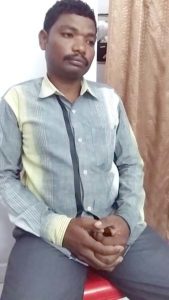
After securing NOC from the panchayat, we were constructing a community hall for Christians on our ancestral land. On 26 June 2015, I was summoned to a gram panchayat meeting to explain the construction. I told them I had the NOC and that I wanted to construct a community bhawan because Christians do not have a hall for social gatherings like marriages and so on. The panchayat leaders told me I was not allowed to construct the building. If the Governor and other authorities upheld my right to construct, they said they would call the Bajrang Dal to get me beaten up. I went ahead and constructed the building.
They (Bajrang Dal) held a rally against Christians in July, pressurizing villagers to participate. That day my child was ill so my wife and I had taken him to the hospital in Jagdalpur. The Hindu villagers gheraoed the police station, and called the SDM who stopped the construction. In August 2015 I showed the Collector all the documents, and the Collector issued a letter of permission for the construction.
On 8 September I resumed the construction work. On 9 September the gram sabha held a meeting in the name of drought relief, then mobilized villagers to the chowk. Some of them came on my land and told me to stop construction. I agreed to stop and talk to them. One Shailesh (alias Chhotu), son of Sabar Singh, lifted a shovel and threatened to kill me. I ran away to save my life. But two women – Ludri and Phulo Baghel – who were working on the construction, were badly beaten with bamboo sticks, and kicked and punched. They surrounded us and did not let us go out of the village. I called my wife who was away at Bastar and she informed the police. The local police were reluctant to come but did come eventually to our house. We also called an ambulance to take the women to the hospital. The TI tore up our FIR and wrote an FIR of their own naming just four of the assailants and protecting 8 others. Even those named surrendered in Court later and got bail – the police did not arrest them.
I have not been able to proceed with the construction. I told the SDM and Collector, but they did not back up their permission letter with force to protect us while we construct. The Chowki in-charge, one Sonwani, even said he cannot send his men to protect us because ‘one community’ (the Christian population) is increasing too much.
On 28 May 2016 we spent the whole day in Court but the defence did not cross question us. After my wife spoke up about the wasted day, the Judge scolded the defence lawyers for wasting time and making the women spend all day in Court doing nothing.
Karmari was one of the gram panchayats that had passed a resolution under Section 129 (C) of the Chhattisgarh Gram Panchayat Act: “To stop forced conversion by outside religious campaigners and to prevent them from using derogatory language against Hindu deities and customs, Karmari gram sabha bans religious activities such as prayers, meetings and propaganda of all non-Hindu religions.” The Bilaspur High Court had deemed this resolution to be unconstitutional. (see Annexure 2)
Pastor Munne Lal Pal, ex-President, United Church Union and
Kabristan (Graveyard) Committee, Jagdalpur
In January 2012, construction was on to build a boundary wall for the Karkapal graveyard that has been in possession of Christians for more than a century. The wall had been sanctioned by the city Mayor. On 8 January, when the wall construction was nearly complete, I got a call to go to the Collectorate. I went there with two others with Pastors Jogendra Nayak and Rajesh Habil, and I was told that I was accused of encroachment of 16-17 dismil of land. I said that I would show him our documents once our Secretary returned from Raipur, and if the measurement of the land proved that we have encroached on any land, we would certainly vacate the encroached part of the land. The Collector agreed that I could show him the documents a couple of days later. We then went home. After 15 minutes the patwari called me to the graveyard. There, I found the Mayor etc along with Bajrang Dal leaders Man Singh Parmar and Kailash Rathi and VHP leader Yogendra Kaushik. They had the JCB machine ready to demolish the wall. We pleaded that the encroachment should be proved first, and the demolition should not be done before measurement and verification of the documents, if the encroachment is proved, we ourselves will break down the wall.
But Bajrang Dal leaders began breaking down the wall, raising slogans. As soon as they touched the wall, some 100 more Bajrang Dal men who had been waiting close by, came up to break down the wall. They kicked and danced on the graves, raising Jai Shri Ram slogans. The JCB machine was also used, and three graves were also flattened. The authorities present did nothing to stop the attackers.
The police did not file our complaint till some 60 Pastors and hundreds of Christians gathered at the Bodhghat Police Station. It was past midnight by the time the FIR was registered. The attackers were released on bail from the police station itself the next day. On 10th January there was a rally and sit-in in Jagdalpur in which 10000 Christians participated.
After that, the police booked 5 criminal cases (2 non-bailable and 3 bailable) booked against 12 of us for leading the rally and sit-in.
In Court, the men we accused were all acquitted. One of the Christian eyewitnesses was intimidated into changing his statement. The police Investigative Officer did not depose at all in Court.
Sanauram Gotta, village Tumasnar, district Kanker
In 2006, Christians (7 in all) of my village were beaten up by the Hindu villagers. In March 2016, the Hindu villagers made a ‘Sitlamandir’ and demanded Rs 500 as ‘chanda’ from each villager. We said that you have been boycotting our marriages and other social functions, so we won’t give you ‘chanda’. We said, if we give you chanda, give it to us in writing that you will attend our social functions, you will call us to your functions. These discussions happened over 2 meetings in 2 days.
When my grandmother died, the Hindu villagers refused to attend the funeral. They did not attend several marriages.
Next, they demanded Rs 1000 as ‘chanda’. We said we are willing as long as you give us an assurance in writing. Instigated by Anil Kumar Kemro, ration leader and son of a BJP leader, Hindu villagers declared a social boycott, claiming we have insulted their gods and goddesses. The tehsildar called me saying that there is a written complaint against you, I told him about Kemro. There are now 100 Christians in the village and we are under threat of violence.
Baman Kowasi, village Parapur/Chhichoripara,
block Lohandiguda, Bastar district
On 15 May, 2016, Bajrang Dal members who live in our village Manku, Sannu, Muda and Saibo beat up my sister Kumli Kowasi (age 18), accusing her of doing ‘jadu tona’ (witchcraft). My father Muda is no more, my mother Maso and my sister and I and our little brother are now in hiding. My sister was grinding rice at 5.30 pm in the back of the house when they came and beat her up. They kicked her in the stomach, pulled her hair and hit her on the head. She fell unconscious and they left her for dead. She had to be hospitalized for two weeks. We have been told by the ‘munshi’ (police) to remain in hiding for our own safety, so for the past month we have not been able to return home. We are living in the Church in another village (name of village withheld).
Kumli Kowasi (from Parapur, now in hiding in another village)
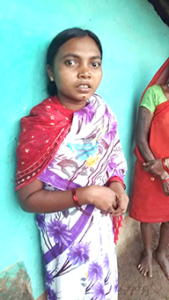
AIPF team members met Kumli in the village where she is hiding. This young woman is very terrified. The team learned from her that the ‘munshi’ at the police station took money from her family and also advised them to stay away from their home. She said that she was beaten up for being Christian, and that those who beat her up are relatives of hers. The Bajrang Dal is instigating even family members to turn violent against their own kin for converting to Christianity.
Pastor Sivo Mandavi, village Sirisguda, block Tokapal, district Bastar
Our rations were stopped for 2 and a half months and ration cards were not ratified because we did not pay ‘chanda’ for ‘Devgudi’ (a Hindu festival). We complained to Food Inspector and were called to collect our rations on 16 June 2014. We went (women, children and all family members) with bags, expecting to get 2 and a half months worth of rations. That day, there was the Monday Bazaar. The Food authorities came and sat at the ration shop at 2.30 pm and asked the ration dealer why they were not giving us rations. The ration dealer and sarpanch, secretary and other villagers were gathered at the panchayat bhawan – they had gathered there in preparation for violence. The panchayat secretary refused to go to meet the food authorities. We went back and forth. Eventually the ‘Sir’ and ‘Madam’ from the food authority themselves went to the panchayat bhawan and told the panchayat secretary they were supposed to go hous to house to ratify the ration cards. The secretary said, ‘Do what you like, I am willing to resign.’ When the villagers said, “We won’t give them rations because they did not pay ‘chanda’ for ‘devgudi’,” the food inspectors explained that “Government rations cannot be stopped because of a village matter like a festival.” Then the villagers erupted and picked up chairs to attack the food inspectors who ran away. Then they began beating up the Christians, injuring 8 men including myself and two women. I was beaten with sticks, fists and kicks. We somehow escaped and called the ambulance, but the villagers blocked the road and did not allow the ambulance to leave the village. After we called the Bastar DIG, the police came and took us to the health centre at Lohandiguda where were admitted for a week, and one Aytu, who had a broken arm, was referred to Maharani Hospital at Jagdalpur.
On 17 May 2014, the gram sabha passed a resolution that non-Hindus cannot live in the village and so on. We got to know this through the papers, since we were in hospital. The police did not come to us to register an FIR, we were able to register an FIR only when we ourselves recovered enough to go to the police station and were assisted by Pastor Bhupendra Khora. There is a case against 12 Christians also, registered by the Bajrang Dal. The High Court meanwhile held the gram sabha resolution to be unconstitutional.
Pastor Abhimalik,
Village Mudhota, thana Bhanpuri, district Bastar

On 19 October 2014, some 30-35 Bajrang Dal people entered the church, beat up Christians including women and children, and told them to become Hindu or else prepare to be killed. (see Annexure 5)
The victims called me for help, and I went with them to Jagdalpur and we gave a representation to the TI. The TI went to the village, and assured that he would hold a meeting and organize a compromise on October 25.
The promised meeting was convened on October 25th, the TI and the SDM were about to reach, and about 400 Hindus including Bajrang Dal people and 70-75 Christians were waiting. The police did not arrive at 2.30. And the Bajrang Dal people must have got a call telling them that the police did not plan to come. They then attacked the Christians, chased them into the jungle or the corn fields, several were badly injured and dispersed. We called a Sanjivani ambulance to get the injured villagers, but the 400 people stopped the ambulance from entering the village. After half an hour when we enquired about the delay, we called the ambulance driver who said he had not been allowed to enter the village. Then we contacted the Control Room Raipur who then called the Bastar police to go clear the road and allow 12 injured people to be brought to hospital. It was a Saturday and there was no treatment done because the hospital dean was threatened and under pressure. On Monday the injured were released without any treatment, just bandages. We had to get the injured treated in a private hospital in Jagdalpur.
2 of our Christian people were sent to jail, and 5 Bajrang Dal people were also jailed. We went to Bastar Chowki to free the arrested people. Our representation was not accepted there till 5 pm, after which the tehsildar said Section 151 cases fall under the SDM’s jurisdiction. The SDM deliberately took leave. As a result the arrested Christians were in jail for three days before they got bail.
After the case started, the Bajrang Dal people filed yet another FIR against us, declaring some of the victims as absconders. We were alerted by a lawyer and we got anticipatory bail.
Christians were told they cannot use the water from the bore well, this is reserved for Hindus. On November 3, 2014, a meeting was called at the Collector’s office, attended by Bajrang Dal and Christian leaders. The Bajrang Dal demanded that the Christians do ‘ghar wapsi’ (reconvert to Hinduism). The Collector tried to reason with them but they claimed that ghar wapsi had the sanction of Section 129 C of the Gram Panchayat Act.
Violations of Forest Rights
in Kanker District
Testimonies
Ramkumar Darro, village Kohche, thana Antahgarh, Kanker district

25 hectares of land have been acquired for Raoghat Mines without informing the villagers, gram panchayat, or gram sabha. (Officially the Raoghat Mines, as well as adjoining dam and railway lines are for Bhilai Steel Plant but a consortium of private companies will be involved with the mining project). Trees have been cut, adivasis’ forest land that they have had for the last 50 years is being grabbed; several places of worship of adivasis are being destroyed and even the burial grounds have been taken over by the company. CRPF camps have come up densely at every kilometer in the area. The railway track passes right through the villages, yet the Government has claimed that there is no habitation for 5 kilometres on both sides of the track!
When I went to the Raoghat hills where mining is imminent, to map our sacred sites (which are stones and trees and won’t be recognised as such by the miners unless we mark them) using GPS, the security forces snatched my cell phone, deleted the photographs and slapped me.
For the past two years I have been filing claims for Community Forest Rights and Individual Forest Rights. I have filed some 1200 claims in Antahgarh block – not even one has been passed. It seems the SDM and tehsildar do not even know the Forest Rights Act, they do not recognise Community Forest Rights!
The SDM terrorized villagers into consenting to land acquisition for a Bhilai Steel Plant (BSP) township and railway lines but the villagers later said this was done under duress. There is great fear of eviction and displacement due to a proposed dam to support the Raoghat mining project.
When the fact finding team of Nandini Sundar, Vineet Tiwari and Sanjay Barate came to our village in May 2016, I took them around. Later, when I was away at a religious function, the police came to my house and told my sister to send me to the police station when I got back. They did not identify themselves or give any reasons. When I got back I went to the police station and asked the Munshi as well as a cop I knew, what was up. They took me by motorcycle to the SDPO (Sub Divisional Police Officer), one Khalko, who asked me where I had taken the fact finding team. He said that Nandini Sundar, Vineet Tiwari and Sanjay Barate are all ‘Naxalites’ and I’ll have to jail you if you associate with them.
But I am not scared of such false cases.
Rape of an adivasi woman by an SPO
A villager from Kanker who did not want to be identified told us that an SPO had raped his daughter, who became pregnant and had a baby. The police refused to file a case and instead mediated a ‘settlement’ whereby the SPO, who is already married and has 2 children, was to pay Rs 50,000. He paid only half the amount. But the father and his daughter are too afraid to pursue the matter.
Fake Encounters
Nagalguda village, thana Gadiras, panchayat Vankapal,
Kuakonda Tehsil, District Dantewada
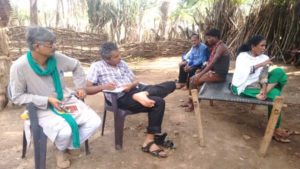
The police claimed to have killed four women – Rame, Pande, Sanni and Mase – here in an encounter at 7 am on 21.11.2015.
Villagers told the team that the encounter was staged. All four women were Maoists but only two of them were in uniform. They had come to the village to resolve a dispute and had asked for utensils to start cooking a meal. The village was surrounded by the police force and the women tried to flee. One of them was killed from afar. Two women were shot dead after they surrendered. One of the women was raped by Badru, a surrendered Maoist who is now a ‘Pradhan Arakshak’ and had accompanied the force, before she was killed. The identity of the witness to this fake encounter is kept confidential at the request of the villagers, for their safety.
22 DRG jawans were decorated and promoted for this ‘encounter,’ in spite of the fact that rewarding jawans for encounters is against NHRC guidelines and Supreme Court guidelines for encounters (see Annexure 6).
Arlampalli village, Dornapal Tehsil, district Sukma
Dudhi Bandi, father of Duddhi Bhima
On 3 November last year, my son Dudhi Bhima (aged 23) had gone to the forest just outside the village with two other village boys – Sodhi Muya (age 21) and Vetti Lacchu (age 19) to drink ‘chhind’ (a local alcoholic drink made out of date palm fruits). The boys went on two cycles. After getting their drink, they were planning to go to the Polampalli Bazaar, where my wife was waiting for them.
Near the ‘nala’ close to the village, one of the boys Sodhi Muya got down from the cycle while the other two went ahead. Security forces were in the area for a combing operation, and caught the two boys on cycles and began beating them up. Sodhi Muya, seeing this, began to run away – and was shot dead by the police. Bhima and Lacchu were asked to carry the body of their friend to the Polampalli thana. Once they placed the dead body on a pick-up van, they too were shot dead.
Vetti Adma, younger brother of Vetti Lacchu
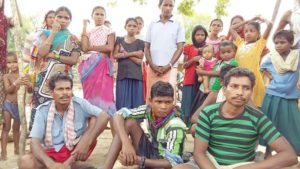
I saw my brother and Bhima alive, carrying the body of Sodi Muya on the road to Polampalli. I saw, from afar, they kept the body in a pick-up van. Then the police tied up Lachcu and Bhima and killed them.
Sodi Budra, father of Sodi Muya
No FIR has been registered as yet. We do not know whether or not a magisterial enquiry has taken place. We went to Raipur and Delhi to tell political leaders what had happened.
The CPI exposed and raised the issue of the Arlampalli fake encounter. The local Congress MLA has also raised it.
Other villagers told the team that Arlampalli was targeted by the Salwa Judum in 2006. Mahendra Karma and Ram Bhuvan himself came to the village, leading the Judum in burning 135 homes down and plundering the village. “We did not get a paisa of compensation,” they said. They said that 11 people from Arlampalli have been killed by the police till now. Madvi Lakhma told us his brother Madvi Joga was shot dead while working in his fields in a fake encounter in 2008, his sister was raped by police, and Vetti Senni, a woman was shot dead in 2008. Sodi Masa said that his brother Sodi Deva was shot dead in 2006. Even in cases like the rape of Madvi Lakhma’s sister where the villagers raised the matter in Raipur, there has been no justice. “We are too scared to pursue these matters, what is the point of raising these issues when the police themselves are the killers?” say the villagers.
Palamadgu village, Dornapal Tehsil, district Sukma
Two Little Girls Killed in Cold Blood
A news item in the Dainik Bhaskar (see Annexure 7 or http://www.bhaskar.com/news/CHH-OTH-MAT-latest-sukma-news-024004-3516841-NOR.html?seq=1) dated January 31st 2016, with the headline ‘Two Fleeing Naxalites Fall in Ditch, Killed By Police,’ quoted police as claiming that two armed women Maoists Vanjam Shanti and Siriyam Pojje were killed after an hour-long gun battle on 30th January 2016. The police claimed to have found ‘two desi bharmar guns, two desi kattas, desi grenades’ and other weapons on the women’s persons.
The ASP Santosh Singh is quoted in the paper stating that they got news of a large Maoist contingent near Palamadgu and went on a searching operation. They found that the Maoists had posted three 13-14 year old children on sentry duty, whom the force first arrested. The ASP claimed that while the Maoist contingent fled to the jungle, two women Maoists who were wearing saris and could not run, fell into the ditch, and thereafter they were killed by the police jawans. The question is that if they had already fallen into a ditch, why were they killed? Also, why were the ‘women Maoists’ wearing saris and not uniforms? The photograph of the bodies, as published in the paper, appears to be that of two very young village girls. The newspaper also reports that locals are questioning the authenticity of the encounter in hushed tones, and saying that the two killed are villagers, not Maoists. The paper notes that the two women are not wearing uniforms but are wearing the clothes usually worn by village girls.
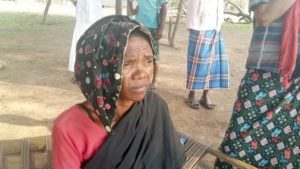
The team reached the village and spoke to Vanjam Aade, mother of Vanjam Shanti. She stood stiff for a while and then burst into tears and was unable to speak very much. She said that her daughter Vanjam Shanti, aged 13, had gone with Siriyam Pojje (14) to release the hens out of the coop and then have a bath in the river, as they did each morning, which is why they had taken a change of clothes with them. The village is close to the jungle, so the villagers coop up the hens at night to protect them from wild animals, and let them out of the coop every morning. At 8 am she was told by villagers that her daughter had been shot dead. She said that Shanti had nothing to do with Maoists. Siriyam Deva, father of Siriyam Pojje, said the same.
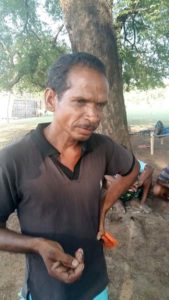
Vanjam Bhima, a teenage youth, said that on the same morning of 30th January, he along with three other older boys were picked up by the police and detained in the police station for 18 days. Vanjam Ganga was also detained by the police for 18 days. They said that Madkam Unga, a youth from the village, has joined the police in the Dornapal thana, and since then he has been getting people from the village arrested. For the past 4 months, 4 boys – Podiyam Bandi, Madkam Chanda, Madkam Som and Kodiyam Kosa have been in jail.
The villagers’ testimony makes it clear that the two children were killed in cold blood and the killing is being passed off as an encounter with women Maoists.
Kadenar village, Bijapur district
A Press Release dated 21st May 2016 on the police website claims that “Two Hard Core Maoists Were Neutralized in Bijapur’ (see Annexure 8 or Press-release two-hard-core-maoists-were-neutralized-in-bijapur).
The Press Release states that the encounter took place between a joint operation of “CoBRA troops of CRPF and State Police” and “a group of 30-35 strong Maoists in the area of village Cherkanti and Karenar under PS- Gangloor , District – Bijapur, Chhattisgarh.” According to the Press Release, the Maoists opened fire and the forces responded. The Press release states that “When the firing subsided, search of the area was done. During search, 2 dead bodies of Maoists including one female in uniform were recovered. The female Maoist has been identified as Tati Hapka, Member of Darbha LOS. The male dead body has been identified as Manoj Hapka, Commander of Kanger Valley Darbha LOS and a rewardee of Rs 5 Lacs by Chhattisgarh Government. Manoj Hapka was involved in many incidents. Most prominent among these is infamous Jheeram Ghati incident on 25 May 2013 wherein 28 people including some top Congress leaders besides Police personnel were killed by Maoists in an audacious attack.”
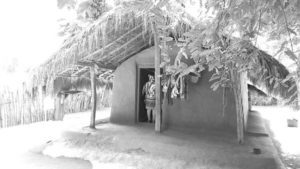
This Press Release raises the question: in an encounter with 30-35 Maoists, how come the two killed happen to be husband and wife? The AIPF team reached Kadenar village, where villagers said that the couple killed were Manoj Hapka and his wife Pandi Hapka/Pandi Tanti. The couple lived with Pandi’s mother and brothers in a hamlet a little distance away. Villagers all said the couple were picked up from home by the security forces while they were having dinner, and killed in cold blood. Manoj and Pandi were buried in the village of Manoj’s birth – Cherkanti, across a river. Some members of the team went on villagers’ motorbikes to visit Manoj’s village and Pandi’s home. The team was accompanied by a local journalist Pushpa, of the Dainik Prakhar Samachar, who had photographed the bodies of Manoj and Pandi after the post mortem.
Testimonies
A Villager Of Cherkanti (name withheld)
I knew Manoj all his life. I saw him grow up, get married. He and Pandi were with the Maoists for a year, but changed their minds and returned five years ago, since when they have been farming in the village itself. Why did the police kill honest people earning an honest living?
Bodhi Madiyam, Manoj’s Uncle, Cherkanti Village
Manoj and Pandi were picked up by the forces from their own home when they were having dinner at 8 pm. Pandi suffered from TB for the past 5 years. They were killed by the police in cold blood – there were knife marks all over their legs. Manoj’s leg was broken and he was shot dead. Pandi was beaten on the head with a rifle butt. Manoj and Pandi were with the Maoists for a year but returned and have lived in Pandi’s maternal home in Kadenar for the past five years. In keeping with our traditions, we cremated them and then buried the remains here in Cherkanti.
Tanti Ramuna, Brother of Pandi Tanti, Kadenar Village
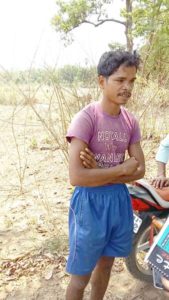
We (my brother and I and our children, Pandi, my mother and Manoj) were eating dinner at 8 pm on 21st May. The forces barged in, tied Manoj’s hands with a towel, took him outside and washed his hands which were soiled with food. They took Pandi also out. Our mother was asked to tie up their clothes, utensils and so on in a bundle and hand it over to the police. They asked her to come to Gangaloor thana in the morning. Next morning she went there at 7 am to be told that the couple had been killed and the bodies were at Bijapur police line. Manoj was wearing shorts and a T shirt when he left home. Pandi was wearing a skirt, a blouse and a towel. The police beat me and my brother Rathu also, as well as a young cousin of ours. I learnt of the killing the next day when I went to Cherpal to grind rice, and then I too went to the Bijapur police lines.
Tanti Bandi, Pandi’s Mother, Kadenar Village
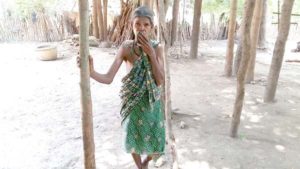
They took Manoj and Pandi away, along with their clothes, other belongings and Rs 13000 that they had earned by harvesting chillies in Andhra Pradesh. Pandi was thin and had TB, she could not have children because she was so sick. For the last month before she died she had severe pains in her stomach, for which she took treatment at the PHC. She and Manoj left the Maoists and came back to the village five years ago. Pandi was so sick, how could she be a Maoist soldier?
Other Findings
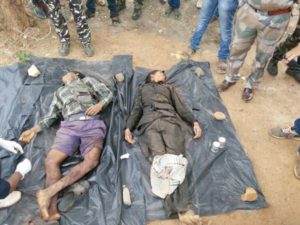
The team met Dr DK Patel at the Cherpal Primary Health Centre (PHC). He said that TB medicines are dispensed by a mitanin (rural health worker) directly to patients in villages, or from a hospital in Bijapur; the PHC would not have any records of TB patients. He said that few villagers from Kadenar came to the Cherpal PHC. However, he checked the PHC’s OPD records between April and May, and found an entry for 23 April 2016, for a 30-year-old woman from Kadenar named ‘Peddi Tanti’, who had been treated for loose motions. The doctor admitted that inaccuracies in writing down names of patients occurs often, given the fact that the medical staff do not speak Gondi and have difficulty understanding the villagers. So it can be accepted that the ‘Peddi Tanti’ of the PHC records is actually Pandi Tanti. This finding corroborates Pandi’s mother’s assertion that her daughter had suffered stomach pains in the month before her death. Also, we may ask if a wanted Maoist leader would walk into a PHC, give her own name and seek treatment?

Pandi’s family members said that they had taken help from a relative to file a complaint with the police stating that the couple was picked up from home and were not Maoists.
The photograph of the bodies of Manoj and Pandi, obtained from journalists, corroborate the villagers’ allegations of marks of torture and injuries. In the photographs, Manoj’s leg is bent at an angle as though broken, and his leg is scored with marks that look as though they are made with a sharp object. (see photo)
Fake Cases, Arbitrary Arrests and Harassment of People’s Representatives
Local newspapers, notably Nai Duniya, had carried a series of stories in May about the illegal detention, torture and arrest of innocent villagers, especially elected representatives of some villages in Gaadiraas Thana of Sukma district (see Annexure 9 and 10). To investigate these allegations, the AIPF team divided itself into two groups. One group visited Padiya village near Gaadiras thana and the other visited Jangampal and Bade Gurbe villages near the Kukanar thana.
Padiya village, Gaadiraas Thana, Sukma district
In Padiya village, Gaadiraas Thana, Sukma district, on 21 May 2016, at 9 am, a force of 200-300 police came and picked up 8 villagers working on a water body, saying they were involved in the breaking of a Essar pipeline on 19 May 2016. 3 others who had gone to Gaadiraas to grind rice, including a 12-year old boy Joga, were also picked up. Police took away these 11 adivasis and kept them illegally in the Gaadiraas thana for several days, where they were badly beaten up. Later they released the three, but the 8 who had been picked up from the water body, remain in jail. The fact-finding team met Joga, who said that he had been made to clean utensils and do other cleaning work during the 7 days that he was detained in the thana.
The villagers also said that some other people who had set out to attend a rally by the Telangana Democratic Forum in Warangal, were also arrested a couple of days later and charged with breaking the Essar pipeline.
At 3 am on the same morning that our team arrived in the village, the police forced sarpanch Madkam Hadma to wear a police uniform and move with the force, arresting four people including Joga’s father. Thus the police conspired to make the sarpanch look like a police agent, making him vulnerable to attacks by Maoists.
The SHO of Gadiras thana said that repeated arrests are done because Joga’s sister is a Maoist ‘Mahila Commander’, whereas more than 150 villagers told the team that this is not true and the girl lives in the village. The team is apprehensive for the safety of Joga’s sister – she may be killed in a fake encounter claiming she is a Maoist. The sarpanch also is in danger of being implicated in such matters.
Jangampal and Bade Gurbe villages, near Kukanar thana, Sukma district
The team set out for Jangampal village, accompanied by Madkaram Sodi, the ex-sarpanch of the village. Madkaram himself along with other ex-sarpanches and husbands of women sarpanches of nearby villages, was picked on May 22 in Kukanar and detained in the Kukanar thana on the pretext that they were going to join an unlawful assembly in Warangal called by the Telengana Democratic Forum. It should be noted that the Telengana police had declared this Sabha to be unlawful, but the Telengana HC had overruled it and given conditional permission to the Sabha – see NTV Telugu report at this link high-court-conditional-permission-to-tdf-sabha-in-warangal.
Testimonies
Madkaram Sodi, ex-sarpanch, Jangampal village
I was planning to go to the Sabha in Warangal, accompanying villagers from this area. The Sabha was to protest against atrocities on adivasis by police and security forces. We were picked up by the police in the morning and detained in the Kukanar thana. We were told that this is a ‘Naxali’ sabha and you will be treated as Maoists. We were released later. But Aytaram Mandavi, the husband of the Sarpanch of Bade Gurbe village, who was picked up with us, has been arrested and is still in jail. Ayta had been arrested earlier also, and his wife was abducted by the police, we had to protest to get her released.
This time also, we heard that the Sarpanch of Nagalguda Madkam Hadma was picked up on 21st and told that he must become a ‘mukhbir’ (police informer) in order to be freed, and the Sarpanch of Chikpal was also picked up on May 24.
Being a Sarpanch or a ‘leader’ in the area marks you out as a target for the police and the CRPF. They threaten, intimidate, even arrest you so that they can pressurise you to become an informer.
The CRPF men saw me accompany you, now they will harass me and question me some more.
Masaram, Current sarpanch, Jangampal village
People were planning to go to Warangal for the Sabha by bus, having hired a bus whose owner is an adivasi. I was saved from being arrested because I did not accompany them. Madkaram was arrested because he was going to the Sabha. In May last year, we had protested when Ayta Mandavi’s wife Sukdi (who is now the Bade Gurbe Sarpanch) was abducted by the police. When we went to the Kukanar thana, the police said “Are you sure the Maoists didn’t abduct her? We don’t know where she is.” Finally when Soni didi (Soni Sori) came to help us to protest and we did a “chakka jam” (road blockade) for two days, Sukdi was released.
Villagers of Bade Gurbe and Chhote Gurbe
The team could not meet Sukdi, the Sarpanch of Bade Gurbe, and wife of Aytaram Mandavi. But villagers of Bade and Chhote Gurbe told us that Aytaram had been arrested repeatedly because he was seen as a leader. He had been acquitted in several cases, but now again he is being arrested and booked in various cases.
Fake Surrenders
There have been 70 surrenders in the Chintalnar area. Malini Subramaniam and Supriya Sharma reported these fake surrenders in Scroll (See http://scroll.in/article/775849/ground-report-the-truth-about-chhattisgarhs-recent-maoist-surrenders and http://scroll.in/article/804384/the-story-the-chhattisgarh-police-does-not-want-you-to-read)
The team visited Chintalnar village where we were told of several staged surrenders. Chintalnar is a village which has a considerable non-adivasi population, as well as adivasi villagers.
Testimonies
A small trader (name withheld)
I was called to the Polampalli thana by an SPO saying there is a warrant against me. I went there where I found 25 others, we were all told that either they must agree to ‘surrender’ or they will be booked in a case of killing Nagesh, an SPO who was killed 2 years ago. I am 55 years old and the other 25 cases were as fake as my own, I didn’t see a single genuine surrender. We all were given Rs 10000 each on the spot.
A villager (name withheld)
6-7 people from Rewalipara and 2-3 of Lacchipara of Chintalnar village were arrested last month on charges of meeting with Maoists. They adivasis, and were implicated by adivasis. 15 from Pujaripara of Mukram also were arrested a couple of months back. They were picked up from home, beaten up and then jailed. Earlier, 10 people from Gomodi, who had gone hunting, were caught from the jungle and arrested.
Around 70 people in and around Chintalnar were pressurized into ‘surrendering.’ The ‘surrenders’ are all fake, no one went of their own accord. None of those who surrendered are really Maoists. The police pressurize people to ‘surrender’ are done so that they can claim success in their anti-Maoist camps/campaign (‘shivir/abhiyan’). The more ‘surrenders’ they show, the more the police officers can claim promotions. Some were picked up at a cock fight and shown as ‘surrendered’; some were called to the police station or the camp and told that they could choose between ‘surrendering’ and being booked on the charge of murdering Nagesh, an SPO from the village who was killed a couple of years back. One Telugu-speaking man is a TB patient, bedridden, and yet he is shown to be a ‘surrendered Maoist’!
Most of those who ‘surrendered’ have returned home. Most of them are yet to face pressure from the ‘andar-walas’ (‘those inside the jungle’, i.e Maoists), they have yet to come and do ‘vasooli’ (extort a levy) of the Rs 10000 that was given to each of the ‘surrendered’ people. Don’t know when the andar-walas will come! Among those who surrendered, a few have signed up as SPOs. But most have returned to their old situations.
We feel hemmed in from both sides – I also feel the same. Maoists ask villagers to come to attend their meetings, provide medical attention and so on. If we say no, we risk annoying the Maoists. If we go, then the police will harass us. The approach roads, bridges near this village and the electricity lines and so on were destroyed by the Maoists. They broke the roads to prevent rations from reaching the Salwa Judum camp. They don’t give ‘anumati’ (permission) for MNREGA work either. Schools have been shifted to Dornapal because of the Maoists. Villagers in the villages deep inside the jungle also are now tired of the Maoists, but are afraid to say so. We are also thoroughly fed up by the police and the camps.
Other villagers
The team spoke to other young men, who were pressurized into participating in the fake ‘surrender’. They were very reluctant to discuss the matter and were obviously afraid of reprisals from the Maoists. We were told that the sarpanch, Kodiam Kosa, is also under threat from Maoists for having facilitated the fake surrenders.
Rape of Minor Girl by
Chhattisgarh Armed Force Jawan
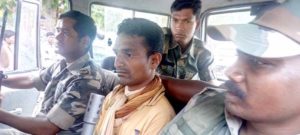
As the enquiry team was returning on 11 June 2016 we got the news that the report of a minor girl being raped by a jawan was being filed in Dantewada thana. On 8 June 2016 this jawan raped 14 year old Sanmati (name changed). People from the enquiry team reached Dantewada thana and helped Bela Bhatia and Soni Sori in the process of registering an FIR and having the medical examination done.
After the enquiry team had returned we came to know that the accused had been identified as DR Netam, an Assistant Constable in the Chhattisgarh Auxiliary Armed Force at Jaram camp. Prior to his arrest he and his family members with the Sarpanch of his village came to Soni Sori’s house and tried to arrange a compromise with the victim’s family. However, the family of the victim remained firm and the accused was arrested.
Sanmati’s Testimony
I come from Podum village. I am 12 years old and study in Class 7, living in a hostel. During the summer vacation I had come to stay at my sister and brother-in-law’s home. My brother-in-law has a provision store where the jawans residing in the camp come to buy provisions. The camp is located next to the Jaram village Panchayat and is 2 years old. A soldier from the camp came to me on 10 April. He wrote his name as RR Netam in a notebook and said his phone number was 9479082401 and he used to talk to me from this number. He used to say I love you, I will marry you, I will pick you up and take you away. On 8 June 2016 at 5. 30 PM he phoned and asked me, are your brother-in-law and sister at home? I replied that they have gone out visiting someone, and I am about to go and close the shop. Then that soldier came to the shop, and after everyone had left he pushed me into the small room in the shop, closed my mouth, forced himself on me and told me that he would kill me if I filed a report about this. In the morning he went away. I was not able to eat anything for 2 days; only once I went to the hand pump behind the shop and drank some water. On 11 June 2016 my brother-in-law and sister returned home and I have come to the thana to file a report.
Observations
We quote some observations on this incident made by Bela Bhatia in an article (/the-rape-of-a-minor-girl-shows-how-justice-is-sought-to-be-compromised-in-dantewada) titled ‘The rape of a minor girl shows how justice is sought to be compromised in Dantewada’.
About the Chhattisgarh Auxiliary Armed Force to which the rape-accused belonged, Bela Bhatia writes, “This force, we may recall, was formed after a Supreme Court order in July that year (2011) that SPOs (Special Police Officers) be disbanded. In the ongoing anti-Maoist counter-insurgency operations, SPOs had become notorious for committing various acts of arson and violence, including rape. That they enjoyed a certain impunity was well known.”
About the entire episode, Bela Bhatia observes, “This is a simple story. But one that shows a consequence of militarisation – especially for those living in the vicinity of police stations and camps – that does not often come to light. The power of a man in uniform, the gallant admission of love, the promise of marriage, the inability to hear a “No”. The attempt at a compromise indicates that compromises happen – that other such instances may have been suppressed in a similar vein.
The purported aim of militarisation is to provide security, but the people of Bastar have been forced to live lives clouded with insecurity on an everyday basis.”
We may note here that in the testimony of the father of the rape victim of Kanker, the police did broker a ‘compromise’ between the accused SPO and the victim and her family.
Custodial Torture
Village Pusgudi, Modakpal thana, Bijapur district
The team investigated a case of custodial torture of youth, leading to the death of one man, from Pusgudi village in Bijapur district. This incident had been reported in local newspapers (see Annexures 11, 12, 13)
Testimonies
Ramchandra Yellam, ex-Sarpanch, Pusgudi village
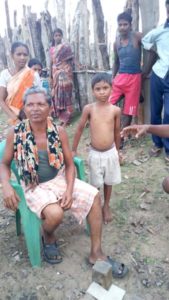
Anganpalli Chinna Mukta of Murkinar village was killed on 5 April. On 7 April 2016, one Anganpalli Ganpat from Mukanar village took 3 men from our village to the Modakpal thana, accusing them of murdering his brother Anganpalli Chinna Mukta. The three men, Ganesh Yellam, Ganpat Yellam and Yellam Sivaiyya, who went willingly, were detained in the thana for enquiries. On 9 April, Ganpat Yellam’s wife Sunita said let us go and see the men at the thana, so some of us took her there. The police told us that the three have confessed to the murder and will be jailed, so we came away without being allowed to meet them.
On 10 April, Sunday, police sent word to the village that Ganpat Yellam is not well and we should take him. When we went there we found that he was badly injured. He told his wife that the police had continuously beaten them for the past three days and had applied chillies and salt to his wounds. He was brought back home but died of his injuries soon after. We protested with his body at the thana, along with local leader Vikram Mandavi. As a result, the TI and SI and three other staff of the Modakpal police station were suspended.
I met the other two men recently. They also were badly beaten and custodial confessions were extracted from them. Rs 20,000 compensation was paid to Ganpat Yellam’s wife, not as compensation but out of the ‘family welfare’ fund (a fund used to pay any family in which a wage-earning youth has died).
Observations: An FIR against the police was filed only in the case of Ganpat Yellam who was killed. The other two men have been jailed on the basis of the custodial confession extracted by torture. The two jailed men also have wives and small children who are in difficult circumstances. The local media that had covered the custodial death has lost interest in the matter after the payment of the paltry compensation.
Poison
In the Name of Amrit (Divine Nectar)
Total Breakdown Of The Health System
The enquiry team reached Ketulnar village in Bairagarh block, Bijapur district where two little girls had died on 30 May 2016 after drinking Amrit milk under the Mukhyamantri Amrit Yojana (see Annexure 14) and several other children were found in seriously ill condition.
Testimonies
Soni Kudiyam, mother of the victim Arati
On 30 May 2016 only 4 children had come to the Anganwadi and this was the first time the Anganwadi centre had served milk to the children. Arati, who was 4 years old, had been going to the Anganwadi for the past 3 years. She used to get meals comprising puffed rice and chana (Bengal gram). On 30 May 2016 she went to the Anganwadi centre at 8 AM. In our area the bazaar is set up in the mornings, so I had gone to the Nemed bazaar. It was 3 PM by the time I returned from the bazaar. I found that my little girl was vomiting and having loose motions at home. The hospital is 9 km away; I did not have any means of transport, so I could not take her to hospital. At 1.30 AM in the night my daughter died. The next day we took her to Kutru thana where the Post Mortem took place. Since then the Anganwadi centre has remained closed.
Lakshmi Miccha, mother of the victim Sharmila
My daughter Sharmila was 3 years old. She went to the Anganwadi centre at 8 AM; at that time my daughter was in good health. I went away to the bazaar. When I returned from the bazaar at 5 PM I saw that my daughter had become unconscious. I myself am a Mitanin (in Chhattisgarh ASHA workers are called Mitanins). At the time of the incident I did not have ORS solution or any medicines for vomiting, loose motions or fever. After drinking milk at the Anganwadi centre all the children returned to their respective homes. Flavoured milk is given once a week. The Anganwadi has been running in the village for the past 10 years. The Anganwadi worker lives in Satna Palli 3 km away. The families of the dead children were given Rs 1,10,000 by the government but no action has been taken against the guilty, no criminal case has been filed against the agency which supplies milk to the Anganwadi and the agency has not been black listed.
Other findings
Enquiries by the team revealed that there are 8 Mitanins in the village, none of whom had ORS solution or any medicines for vomiting, loose motions, malaria, or fever on the day of the incident. The government is trying to pin the blame for the little girls’ deaths on the Anganwadi workers. It is clear from the advertisement (Annexure 14) that this flavoured milk requires many rules to be followed. For example, it has to be kept at normal temperature in a clean and dry place; is such a place available in the Anganwadi? How can the milk be stored in the summer season when the temperature is much above normal? Children and parents have to be educated to know that no sour substance should be eaten before and after drinking the milk—is it possible to keep such a strict watch over each child? A child who is allergic to milk should not be given milk: can the Anganwadi workers, who are not doctors, recognize allergy to milk? Given the conditions in rural India, should such a substance be served in Anganwadis? It is written in the poster that the Anganwadi worker and assistant should first taste the milk and satisfy themselves that it is all right—but such a rule is a violation of their own rights, and puts their lives at risk.
Camps and Checkposts
The intimidation and daily humiliation and danger faced by villagers at police and CRPF check posts and camps is a matter of grave concern.
The AIPF team was stopped, searched and questioned at the CRPF camp that falls on the road between the Kukanar thana and the village. CRPF men came out and wanted to know ‘Are you from JNU? Why are you visiting the villagers? Why do you only listen to the villagers’ side of the story, why not visit our camp and tell our side as well?’ They continued, ‘Tell villagers we don’t want to harm them, we only want development. Once development is achieved, our job here will be done and we can leave.’ When they spotted Madkaram Sodi, ex-sarpanch of Jangampal village, with the team, they immediately took him aside saying ‘Oh, so YOU are with them! Where are you taking them and why?’ When he replied that advocate Shalini Gera had called him and requested him to guide the team, one of the CRPF men said, “So you think you’ve become a big man, who talks to lawyers from Delhi, huh?’ When they finally let us proceed, they kept reminding us that they would wait to see us on the way back.
The road from Dornapal to Chintalnar is also covered densely with CRPF camps. Three members of our team made this journey in a local autorickshaw, whose driver said he regularly plies that route. At every CRPF camp, he would get down and walk up to the guards to give his name, number, father’s name and so on. We asked him why he was doing that even when he was not being stopped by the guards, and he said, “I have to do it at each camp. If I fail to, they may do anything to me. Today, you are with me and so they are behaving somewhat decently. Usually they shower abuse and threats on me.” On the way to and from Chintalnar, we gave a lift to some villagers who were walking in the same direction. The CRPF men, who would come out to take our photographs and names, would treat these villagers with utter contempt and intimidation. The tall and strong CRPF men would loom over the diminutive villagers, pull them out of the auto and hold their necks, asking them, “Why did you have to come out of the village? Where are you going and why?” Again, the auto driver said that their behavior was more civil than usual because of our presence.
The CRPF men are, as a rule, not from Bastar or Chhattsigarh. Their attitude suggests that they see the adivasis uncivilized. They have no respect for the dignity, the language or culture of the adivasis. They themselves are young men, who live in fear of a Maoist attack, and have been encouraged to see every adivasi as part of the ‘enemy camp’. This was revealed by the way in which the CRPF men who spoke to us, said that we should cover the villagers’ ‘side’ as well as the CRPF men’s ‘side’. Clearly, in their mind there are two sides – no room for villagers who might not have taken sides. Their words also revealed what they meant by ‘development’. We found hoardings at several places (see Annexure 15) saying ‘Renounce Maoism, Support Development’, which laboured the point that the Government stands for development, health services and so on, while Maoists stand for terror and violence. If ‘development’ meant the welfare of the adivasi villages – in terms of healthcare, education, nutrition and so on – why would the villagers be opposed to it? Why would the CRPF and police and Government machinery need to ‘persuade’ them to support such development? The fact is that ‘development’ in the area has meant the threat of eviction of adivasis from their land, destruction of the forests for mining, and the regime of fear and violence that the police and CRPF camps represent for ordinary adivasis. The police and CRPF also make the villagers even more vulnerable to arbitrary violence by Maoists, by forcing villagers and elected representatives to be counted as informers and collaborators in fake surrenders and fake encounters. In the minds of villagers, it is by no means clear that the ‘Government’ stands for ‘development’. Rather, in their eyes, ‘Government; stands for the daily disrespect of their identity and dignity; danger of rape and violence against women and children; fake encounters and displacement in the name of ‘development.’
An Atmosphere of Fear, Insecurity
and Mutual Suspicion
In the villages that the team visited, there was an atmosphere of mutual suspicion and deep insecurity among the villagers. The adivasi villagers are fearful that the police and paramilitary forces will brand them as “Maoists”; but at the same time they are also fearful that the Maoists will brand them as “informers”. Incidents in which Maoists unleash violence upon civilians, branding them “informers” and killing them are extremely worrying. A situation of polarization—in which the State and the Maoists both put pressure on them saying they must perforce take one side or the other—is very stressful and insecure for them. The situation of elected people’s representatives is also worrisome, where the police demands that they openly become informers and facilitate fake surrenders, and they live in fear of Maoist violence. There are people’s representatives who have been jailed and who have opposed state oppression on villagers. The Maoists also do not differentiate between those who dissent and hold different views and those who are agents of the government. In an interview given to Mint on 22 June 2009 CPI (Maoist) Politburo member Com. Bimal said, “In a war, there are no civilians – there are people either on your side or against you.”
There is an old Salwa Judum camp at Ketulnar near Kutru. The enquiry team could not go into the camp due to time constraints but managed to speak to a few people near the camp. We spoke to a Gondi adivasi man (whose name is being withheld for the sake of their security). They told us, “My village is 40 km from here, there is no road, school or hospital in my village. The Maoists had abducted 6 people in my village, out of whom 3 were killed. The remaining 3 were badly beaten and then released. Afterwards in connection with some other incident our father feared that the Maoists would kill him, so the whole family shifted to the camp in 2012. A lot of people lived in the Salwa Judum camp; the government made no arrangements for them. We used to get rations only when some rally had to be taken out. Many people have returned to their villages because of this. The government has neither given us house or land, nor has it made any arrangement for our livelihood. We want to go back to our village. We have 4 acres of agricultural land in the village. About 2000 people are living in the camp who have either been brought from other villages by the government or have come by themselves. They work as labourers for their livelihood”.
Organizations like the “Naxal Peedit Sangharsh Samiti” want to bring people like this person into their fold; such organizations are also politically used by the government. But the government and government machinery do not want a solution for the troubles of such people. They are not trying to reduce the inhuman polarization which is present in Bastar.
The Naxal Peedit Sangharsh Samiti had taken out a rally against Bela Bhatia and burnt her effigy. The utilization of such organizations against researchers and activists like Bela Bhatia is unfortunate. Bela herself says, “Some people are also affected by Maoist violence and their voices need to be heard”. (http://scroll.in/article/805893/we-know-what-naxals-are-like-she-is-not-one-of-them-support-for-researcher-bela-bhatia-in-bastar)
However, using people affected by Maoist violence as a shield to brand and target people—such as Community Party of India (CPI) activists, advocates and journalists—as “Maoist supporters” is wrong.
Salwa Judum Is Operating In Other Guises
Even After Being Banned By Supreme Court
Even after the Supreme Court directive against it, Salwa Judum is in operation under the name of “Samajik Ekta Manch” (which dissolved itself after its exposure by a recent India Today sting operation) and other such organizations. These organizations do not have an independent presence, but work as an arm of the government. The mid-April India Today sting operation proved that the Samajik Ekta Manch which called itself a spontaneously born anti-Maoist organization was actually an agent of the police. In the sting (indiatoday/story/sting-op-exposes-how-activists-lawyers-were-hounded-out-of-chhattisgarh), senior police officials were caught on camera saying that this Manch was formed by the police to do “our work” – to help the police by driving out “trouble-making elements” like journalist Malini Subramaniam, Jagdalpur Legal Aid Group advocate Shalini Gera, and researcher and human rights activist Bela Bhatia from Bastar. In the sting, a Samajik Ekta Manch leader also said that the Supreme Court has closed down Salwa Judum, so we have formed this new organization to carry forward the work of Salwa Judum. He also said in the sting that if we have to close down the Samajik Ekta Manch, we will still carry on our work through other organizations like Vikas Sangharsh Samiti, Adivasi Ekta Manch, and Mahila Ekta Manch. After this sting, the Samajik Ekta Manch was dissolved and Chhattisgarh Chief Minister Raman Singh had to institute an enquiry into this matter. But the Bastar Police IG, who is himself implicated in this matter, has been made part of the enquiry; therefore, the enquiry does not appear to have much credibility.
Conclusions and Recommendations
The team found that Constitutional provisions are being openly flouted to a dangerous degree in the whole of Bastar. The Government’s policy of militarization is having disastrous effects. Above all, the space for democratic protests and the functioning of political parties and mass organizations is extremely circumscribed. Political parties like CPI and activists like Soni Sori who raise issues of human rights and civil liberties are subjected to harassment at the hands of the police.
Arbitrary arrests and illegal detentions are common, and the absence of legal help for the villagers, combined with lack of adequate media attention, allow the police and paramilitary to flout laws with impunity. Groups like the Jagdalpur Legal Aid Group that had been trying to fill the vacuum and provide some measure of legal support for villagers caught in the crosshairs of false cases, have been forced by the police to leave Bastar.
In areas where Christian minorities are present, the RSS outfits are acting as a law unto themselves, terrorizing the minorities. They have no fear of stern action by the police because they feel they enjoy patronage of the Government and the ruling party.
Villagers are extremely vulnerable to sexual violence by police and paramilitary personnel. In April 2016, a fact-finding team of the Coordination of Democratic Rights Organisations and the Women Against Sexual Violence and State Repression had visited Bastar and prepared a Report “State of Siege: Report on Encounters and Cases of Sexual Violence in Bijapur and Sukma Districts” (state-of-siege_report_29th-april). Since the AIPF visit, the horrific case of rape and murder of the teenage girl Madkam Hidme in Gompad village has come to light. The High Court has ordered the exhumation of the body after agitations by local people. (a-stark-nude-body-wrapped-in-plastic-what-happened-to-a-young-woman-in-chhattisgarh)
Having heard testimonies of women from conflict areas in Kashmir, the North-East, Chhattisgarh, Odisha and Andhra Pradesh, the Justice Verma Committee had made the following recommendations:
- a) Sexual violence against women by members of the armed forces or uniformed personnel must be brought under the purview of ordinary criminal law;
- b) Special care must also be taken to ensure the safety of women who are complainants and witnesses in cases of sexual assault by armed personnel;
- c) There should be special commissioners – who are either judicially or legislatively appointed – for women’s safety and security in all areas of conflict in the country. These commissioners must be chosen from those who have experience with women’s issues, preferably in conflict areas. In addition, such commissioners must be vested with adequate powers to monitor and initiate action for redress and criminal prosecution in all cases of sexual violence against women by armed personnel;
- d) Care must be taken to ensure the safety and security of women detainees in police stations, and women at army or paramilitary check points, and this should be a subject under the regular monitoring of the special commissioners mentioned earlier.
These recommendations are not only pertinent in the context of sexual violence, they can also help us find a solution to violence against citizens in the conflict areas.
We feel that the national commissions – for women, minorities, Scheduled Castes and Tribes need to show greater vigilance and independently monitor the situation in Bastar.
We would also like to comment on the role of the media. Some local papers and journalists as well as journalists from independent news portals have pursued stories of human rights violations very courageously, in spite of hostility and harassment by the police. Some national newspapers and television channels have also done some good stories on Bastar, especially on the harassment of rights activists and journalists in the region. But we strongly feel that the national media needs to do much more in terms of sustained coverage that can help achieve the nationwide concern and attention that Bastar deserves.
Our recommendations
- A team of special commissioners or a monitoring committee must be appointed by the Supreme Court to monitor Constitutional rights and civil liberties in Bastar. Such a committee or team of commissioners, on the lines of that suggested by the Verma Committee, must monitor the situation of citizens’ safety in general as well as the safety of women in particular. The committee must be vested with adequate powers to monitor, investigate and initiate action for redress and criminal prosecution in all cases of custodial violence and sexual violence by police or armed personnel. It must also monitor the safety of citizens, especially women, in police stations and at paramilitary check posts, as well as the safety of citizens, especially women and children in villages close to paramilitary camps.
- The Supreme Court should also appoint a separate team to monitor the conduct of the police and district administration in responding to communal campaigns against Christian minorities in the area. Here, also, this team should be vested with powers to initiate action for redress and criminal prosecution against any individuals or outfits that seek to curtail the rights and liberties of Christian minorities in the Bastar region.
- Magisterial enquiries into individual atrocities are insufficient even if these take place. Judicial enquiries must be ordered into each of the alleged fake encounters and all the guilty punished.
- Perpetrators of communal violence must be punished.
- The process of acquisition of forest land for mining and related projects in Kanker must be stopped immediately until an independently appointed team can verify whether the provisions of the Forest Rights Act and PESA are being strictly followed.
- The National Commission for Women, National Commission for Minorities and National Commission for Scheduled Castes and National Commission for Scheduled Tribes could also post teams in Bastar on a permanent basis, inviting and investigating complaints and also independently visiting villages regularly.
- National media – including newspapers as well as television channels – could post a team of reporters, videographers and camerapersons on a permanent basis in Bastar, using their resources to travel to villages to follow up on news of human rights violations. The television channels could find more space regularly on their national news broadcasts and panel discussions, to report and discuss news of rapes and rights violations in Bastar.
- Education and health are in a critical condition in Bastar. Village-level schools and health centres need to be strengthened on an urgent basis.
- Maoists must desist from violence against civilians.
- Above all, steps need to be taken to bring about a political solution and restore peace in Bastar. To that end, the State and Central Governments must initiate peace talks with the Maoists. Militarisation can offer no solution to the conflict. The ‘Operation Green Hunt’ and its variants must be stopped and all paramilitary forces withdrawn from the Bastar region.
Annexures
Annexure 1 –
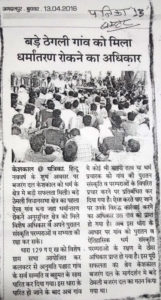
Newspaper report on panchayat resolution in Bade Thegli village invoking Section 129 (c) of Chhattisgarh Gram Panchayat Act to ‘ban’ conversion
Annexure 2 –
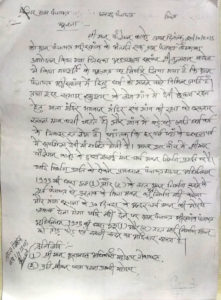 Notice to Pilaram Kawde by Panchayat of Bhadisgaon village citing Sections 55 (1) and (2) Chhattisgarh Gram Panchayat Act 1993 to prevent construction of prayer hall
Notice to Pilaram Kawde by Panchayat of Bhadisgaon village citing Sections 55 (1) and (2) Chhattisgarh Gram Panchayat Act 1993 to prevent construction of prayer hall
Annexure 3 –
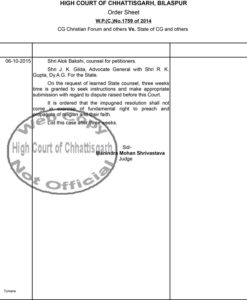
Bilaspur High Court order that a resolution under Section 129 (c) of Chhattisgarh Gram Panchayat Act shall not be allowed to come in the way of the fundamental right to preach and propagate religion
Annexure 4 –  Representation by villagers of Dhuragaon village, tehsil Lohandiguda demanding allocation of separate burial grounds for Christians
Representation by villagers of Dhuragaon village, tehsil Lohandiguda demanding allocation of separate burial grounds for Christians
Annexure 5 – 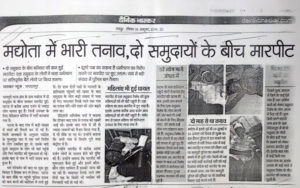 News clipping of violence against Christians in Mudhota village
News clipping of violence against Christians in Mudhota village
Annexure 6 – 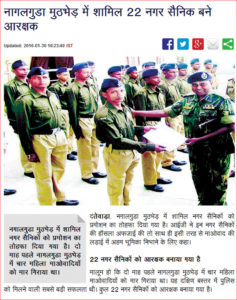 News report on 22 DRG jawans been rewarded for Nagalguda “encounter”
News report on 22 DRG jawans been rewarded for Nagalguda “encounter”
Annexure 7 – 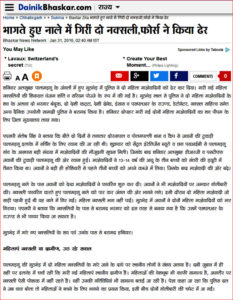 Dainik Bhaskar news story on Palamadgu encounter
Dainik Bhaskar news story on Palamadgu encounter
Annexure 8 –
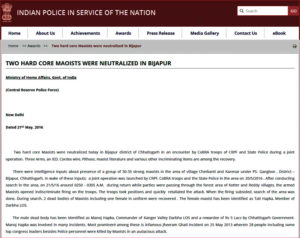
Police press release on Kadenar encounter
Annexure 9 –
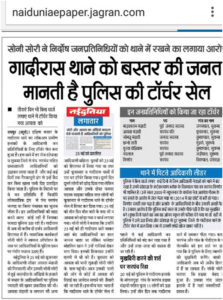
Nai Duniya story on illegal detention in Gaadiraas thana
Annexure 10 –
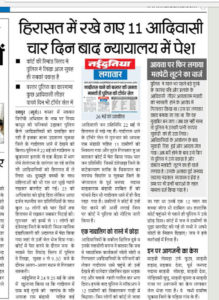
Nai Duniya story on illegal detention in Gaadiraas thana
Annexure 11 –
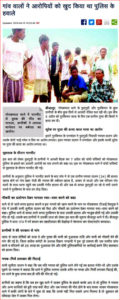
Patrika story on Modakpal thana custodial death
Annexure 12 –
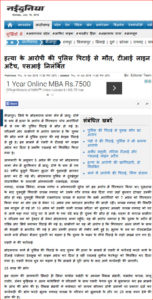
Nai Duniya story on Modakpal thana custodial death
Annexure 13 – Dainik Prakhar Samachar story on Modakpal thana custodial death
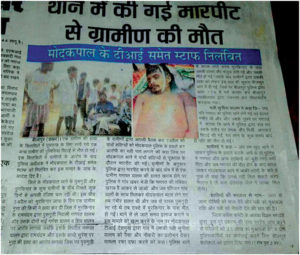
Annexure 14 –
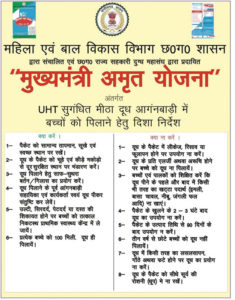
Advertisement of Mukhyamantri Amrit Yojana
Annexure 15 –
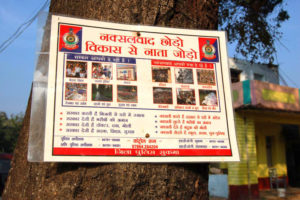
Government anti-Maoist propaganda hoarding

